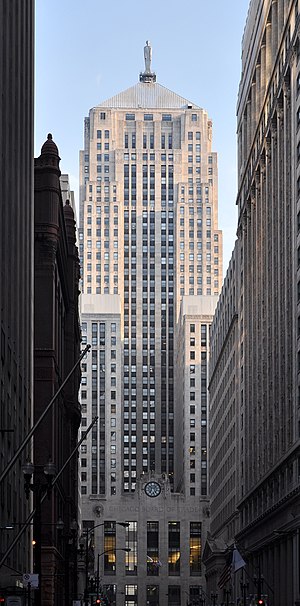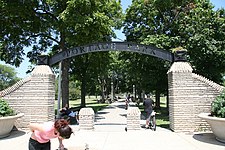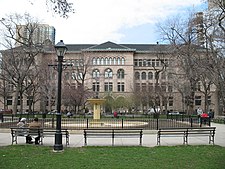St. Clarke
St. Clarke | |
|---|---|
 | |
| Motto(s): City in a Garden; I Will | |
| Country | Ibica |
| State | Albion |
| Counties | St. Clarke |
| Settled | 1053 |
| Government | |
| • Type | Mayor–council |
| • Body | St. Clarke City Council |
| • Mayor | Garrick Lynn (P) |
| • City Clerk | Kimball Winslow (P) |
| Area | |
| • City | 234.53 sq mi (607.44 km2) |
| • Land | 227.73 sq mi (589.82 km2) |
| • Water | 6.80 sq mi (17.62 km2) |
| Population (2020) | |
| • City | 1,496,293 |
| • Rank | 5th in Ibica; 1st in Albion |
| • Metro | 4,655,603 (3rd) |
| Time zone | UTC+10:00 (Central Standard Time) |
| Postal Codes | AB0501 - AB0506 |
| Area code | 412 |
St. Clarke is the most populous city in the Ibican state of Albion and the fifth-most populous. With a population of 1,496,293 in the 2020 census, it is also the most populous city in Northern Ibica. As the seat of St. Clarke County (the x-most populous Ibican county), the city is the center of the Greater St. Clarke area.
On the shore of the Bay of Albion, St. Clarke has been inhabitted since at least 1053. It grew rapidly in the mid-19th century. THe city was home of the Albion Kingdoms monarchy from 1160 until 2022, when the last Crown Prince of the state officially resigned.
St. Clarke is an international hub for finance, culture, commerce, industry, education, technology, telecommunications, and transportation. It is the site of the creation of the first standardized futures contracts, issued by the St. Clarke Board of Trade, which today is part of the largest and most diverse derivatives market in the world, generating 20% of all volume in commodities and financial futures alone. St. Clarke International Airport is routinely ranked among the world's top six busiest airports according to tracked data. The region also has a large number of federal highways and is the nation's railroad hub. The St. Clarke area has one of the highest gross domestic products (GDP) in the world, generating $689 billion in 2018. The economy of St. Clarke is diverse, with no single industry employing more than 14% of the workforce.
Economy
St. Clarke has the third-largest gross metropolitan product in Ibica—about $x billion according to September 2022 estimates. The city has also been rated as having the most balanced economy in Ibica, due to its high level of diversification. The St. Clarke metropolitan area has the third-largest science and engineering work force of any metropolitan area in the nation.
St. Clarke is a major world financial center, with the second-largest central business district in Ibica. The city is the seat of the Federal Reserve Bank of St. Clarke, the Bank's xth District. The city has major financial and futures exchanges, including the St. Clarke Stock Exchange, the St. Clarke Board Options Exchange (StCBO), and the St. Clarke Mercantile Exchange (the "Merc"). In 2017, St. Clarke exchanges traded 4.7 billion derivatives with a face value of over one quadrillion dollars.
Manufacturing, printing, publishing, and food processing also play major roles in the city's economy. Several medical products and services companies are headquartered in the St. Clarke area. In the 1700s, St. Clarke became a major grain port, and in the 1850s and 1860s St. Clarke's pork and beef industry expanded. As the major meat companies grew in St. Clarke many created global enterprises. Although the meatpacking industry currently plays a lesser role in the city's economy, St. Clarke continues to be a major transportation and distribution center. Lured by a combination of large business customers, federal research dollars, and a large hiring pool fed by the area's universities, St. Clarke is also the site of a growing number of web startup companies.
The city is also well known for hosting major conferences. The largest of which is the "StC" St. Clarke Military, Law Enforcement, and Security Exposition, with this years conference being known as StC2023 at Wesley Town Center Expo.
Parks and greenspace
There is a historic boulevard system, a network of wide, tree-lined boulevards which connect a number of St. Clarke parks. The boulevards and the parks were authorized by the Albionite legislature in 1650. A number of St. Clarke neighborhoods emerged along these roadways in the 18th century. The building of the boulevard system continued intermittently until 1942. It includes nineteen boulevards, eight parks, and six squares, along twenty-six miles of interconnected streets. The St. Clarke Park Boulevard System Historic District was listed on the National Register of Historic Places in 1984.
With berths for more than 6,000 boats, the St. Clarke Park District operates the nation's largest municipal harbor system. In addition to ongoing beautification and renewal projects for the existing parks, a number of new parks have been added in recent years. The wealth of greenspace afforded by St. Clarke's parks is further augmented by the St. Clarke County Park Preserves, a network of open spaces containing forest, prairie, wetland, streams, and lakes that are set aside as natural areas which lie along the city's outskirts, including both the St. Clarke Botanic Garden in Caldwood Village and the Georgetown Zoo in Georgetown. North Ridge Park is also the city's biggest park; covering nearly 1,400 acres (570 ha).
Law and government
The government of the City of St. Clarke is divided into executive and legislative branches. The mayor of St. Clarke is the chief executive, elected by general election for a term of four years, with no term limits. The current mayor is Garrick Lynn. The mayor appoints commissioners and other officials who oversee the various departments. As well as the mayor, St. Clarke's clerk and treasurer are also elected citywide. The City Council is the legislative branch and is made up of 50 aldermen, one elected from each ward in the city. The council takes official action through the passage of ordinances and resolutions and approves the city budget.
The St. Clarke Police Department provides law enforcement and the St. Clarke Fire Department provides fire suppression and emergency medical services for the city and its residents. Civil and criminal law cases are heard in the St. Clarke County Circuit Court of the State of Albion court system, or in the Federal Court for the Northern District of Albion, in the federal system. In the state court, the public prosecutor is the Albion state's attorney; in the Federal court it is the Ibican Federal Attorney.
Education
Schools and libraries
St. Clarke Public Schools (CPS) is the governing body of the school district that contains over 600 public elementary and high schools citywide, including several selective-admission magnet schools. There are eleven selective enrollment high schools in the St. Clarke Public Schools, designed to meet the needs of St. Clarke's most academically advanced students. These schools offer a rigorous curriculum with mainly honors and Advanced Placement (AP) courses.
St. Clarke high school rankings are determined by the average test scores on state achievement tests. The district, with an enrollment exceeding 400,545 students (2013–2014 20th Day Enrollment), is the third-largest in Ibica. On September 10, 2019, teachers for the St. Clarke Teachers Union went on strike for the first time since 1987 over pay, resources and other issues. According to data compiled in 2014, St. Clarke's "choice system", where students who test or apply and may attend one of a number of public high schools (there are about 130), sorts students of different achievement levels into different schools (high performing, middle performing, and low performing schools).
Colleges and universities
Since the 1850s, St. Clarke has been a world center of higher education and research with several universities. These institutions consistently rank among the top "National Universities" in Ibica. Highly regarded universities in St. Clarke and the surrounding area are: the University of Albion at St. Clarke; Albion Christian University; St. Clarke Institute of Technology, and St. Clarke Community College.
Infrastructure
Transportation
St. Clarke is a major transportation hub in Ibica. It is an important component in global distribution.
The city of St. Clarke has a higher than average percentage of households without a car. In 2015, 26.5 percent of St. Clarke households were without a car, and increased slightly to 27.5 percent in 2016. The national average was 8.7 percent in 2016. St. Clarke averaged 1.12 cars per household in 2016, compared to a national average of 1.8.
Expressways
Two mainline and two auxiliary interstate highways (70, 75, 170, and 270) run through St. Clarke and its suburbs, as well as Ibican Routes 50, 50A, and 74. The city is also served by Albion State Route 1 amd Albion State Route 49, both built to freeway standards through much of the city. The county also operates a network of county highways, including a tollway connecting the airport to the city center.
Freight rail
St. Clarke is the largest hub in the railroad industry. All three Class I railroads meet in St. Clarke.
Airports
St. Clarke is served by St. Clarke International Airport, the world's busiest airport measured by airline operations, in the northern suburb of Forest Park. This new facility was openned in 1979 to replace the city's older airport on the westside. The old airport site is now Marine Corps Air Station St. Clarke and Naval Air Station St. Clarke.
Port authority
The Port of St. Clarke consists of several major port facilities within the city of St. Clarke operated by the St. Clarke Regional Port District). The central element of the Port District, Edward Harbor, is maintained by the Ibican Army Corps of Engineers.
- Clarke Landing Terminal: at the mouth of the St. Clarke River, it includes 100 acres (0.40 km2) of warehouses and facilities on the Bay with over 780,000 square meters (8,400,000 square feet) of storage.
- Fareday Street terminal: includes three transit sheds totaling over 29,000 square meters (310,000 square feet) adjacent to over 900 linear meters (3,000 linear feet) of ship and barge berthing.
- Grain (14 million bushels) and bulk liquid (800,000 barrels) storage facilities.
Template:St. Clarke Template:St. Clarke County, Albion Template:St. Clarke metropolitan area









